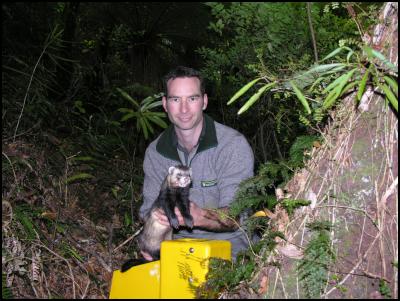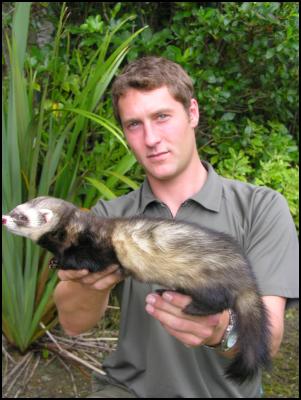Pukaha ferrets captured
Pukaha ferrets captured

Click to enlarge
DOC Ranger Darren Page with male ferret, Photo taken by Kathy Houkamau, DOC

Click to enlarge
DOC Ranger Tom Studholme with female ferret, Photo taken by Darren Page, DOC
One of two ferrets caught in
the Pukaha Mount Bruce forest over the long weekend is
thought to be responsible for the deaths of four kiwi there
this month.
A large male ferret weighing 1.5kg was found in a trap close to the site of the kiwi fatalities on Friday morning. A female ferret weighing 800g was found in the same block on Saturday morning.
It is believed that the male may have been responsible for the deaths. Tests are being carried out by vets at the New Zealand Wildlife Health Centre, Massey University, to try and match DNA.
DOC programme manager biodiversity Rosemary Vander Lee said the capture was a relief to the Department of Conservation staff and the BNZ Save the Kiwi programme after the shock of losing four kiwi to a predator during April. Rosemary is working with other predator experts to see if anything can be done better to protect the native wildlife in the Pukaha forest from future predation.
“We are seeking more advice about the predator control in the forest to ensure that the most appropriate steps are taken to try to avoid any further occurrences.
“Losing kiwi is a difficult experience for us but we must learn from this event and ensure that steps are taken to minimise chances of reoccurrence of the event happening in the future” said Rosemary.
“The predator control programme is going to be reviewed as we would like to ensure that potential threats are eliminated from the forest. It’s impossible to eliminate pests completely as the forest is unfenced but that’s why this area is so special.”
BNZSK programme started reintroducing kiwi to the area in 2003 and pest control work is an ongoing necessity to ensure the kiwi’s long-term survival. The unfenced area is the first example of restoration on the mainland. DOC use fitted radio transmitters to track the birds so that they could have conditions similar to what they would find in the wild.
Each of the kiwi have been adopted by local schools and the DOC team are contacting school staff to ensure the children understand what has happened.
--
BNZ Save the Kiwi Trust was established in November 2002 by Bank of New Zealand and the Department of Conservation, building on a sponsorship relationship that started in 1991. BNZ Save the Kiwi Trust is responsible for public awareness and education, fundraising, sponsorship and grant allocations for kiwi recovery nationally. In 2007 alone, $760,000 was allocated to community and DOC kiwi projects. This money came from Bank of New Zealand, its staff, customers and supporters of BNZ Save the Kiwi Trust.
BNZ Operation Nest Egg™ is a powerful tool to reverse the decline of key kiwi populations. Eggs and chicks are harvested from nests to save them from stoats and cats. The young kiwi are returned to the wild when they weight about 1kg, big enough to fight off these predators. More than 800 kiwi chicks have been returned to the wild since the programme began in 1994, with captive facilities and hundreds of field workers from DOC and community groups throughout the country contributing to its success. The BNZ Operation Nest Egg™ egg harvesting>chick rearing>return to the wild technique was developed through research funded solely by Bank of New Zealand and is now also used in other species recovery programmes.
www.savethekiwi.org.nz
ENDS


 Greenpeace: New Anchor Butter Owner Must Go Palm Kernel-free
Greenpeace: New Anchor Butter Owner Must Go Palm Kernel-free Science Media Centre: What To Expect From COP29 – Expert Reaction
Science Media Centre: What To Expect From COP29 – Expert Reaction Infrastructure New Zealand: Unlocking ‘Lazy’ Capital To Build New Infrastructure For Our Future
Infrastructure New Zealand: Unlocking ‘Lazy’ Capital To Build New Infrastructure For Our Future Parrot Analytics: Paramount Earnings - Can Ellison Strike The Right Balance?
Parrot Analytics: Paramount Earnings - Can Ellison Strike The Right Balance? NZ Trade and Enterprise: NZ Businesses Deliver $340 Million Trade Boost For New Zealand In China
NZ Trade and Enterprise: NZ Businesses Deliver $340 Million Trade Boost For New Zealand In China Ngā Manu Nature Reserve: Celebrating The Return Of Tuatara To Ngāti Koata And Brook Waimārama Sanctuary
Ngā Manu Nature Reserve: Celebrating The Return Of Tuatara To Ngāti Koata And Brook Waimārama Sanctuary



